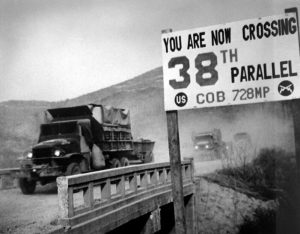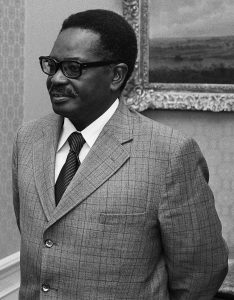47 Cold War Proxy Wars by Brodie Clancy
1. Investigating proxy wars: Jigsaw activity

| Curriculum context | VCE Modern History Unit 2: The Changing World Order, Area of Study 1: Causes, course, and consequences of the Cold War (VCAA, 2020) |
| Historical context | Proxy wars and conflicts that reflected the consequences of tensions and divisions of the Cold War: The Korean War, the Vietnam war, the Cuban missile crisis, and the civil war in Angola |
| Historical thinking concepts | Analyse sources for use as evidence
Identify different historical interpretations about the causes and consequences of the Cold War Analyse the causes and consequences of the Cold War |
| Learning intentions | Develop an understanding and become a ‘mini expert’ in your group’s proxy war.
Use research skills to find, summarise and present information on your group’s topic. Develop an understanding of other group’s proxy wars. |
Activity
For this activity you will need to break up into four different home groups. Each group member will be assigned a different proxy war from the following:
- The Korean War
- The Vietnam War
- The Cuban Missile Crisis
- The Civil War in Angola
Group members will then move into their expert groups to investigate their topic and become ‘mini-experts’ in order to create a presentation they will then use to teach their peers in their home group about their topic. Presentations should be backed up by evidence and each group needs to carefully select their sources and reference appropriately. The presentations must be able to be displayed or stored digitally for everyone to access after the activity has ended.
The presentation should cover these essential aspects:
- What historical, political, and social factors led to this war?
- Why is this event called a proxy war?
- Who were the main powers involved in each war?
- How do the ideological differences between the US and USSR effect these events?
- What impact did media coverage have on these conflicts?
- What were the perspectives of the people in those areas?
- How were these conflicts resolved?
- How do perspectives differ now in the future?
Sources to start with:
US Involvement in the Korean War
Angola Independence and Civil War
References
The Editors of Encyclopaedia Britannica. (2019). Angola – Independence and civil war | Britannica. In Encyclopedia Britannica. https://www.britannica.com/place/Angola/Independence-and-civil-war
Millett, A. R. (2019). Korean War | Combatants, Summary, Facts, & Casualties. In Encyclopaedia Britannica. https://www.britannica.com/event/Korean-War
Spector, R. (2018). Vietnam War | Facts, Summary, Casualties, & Combatants. In Encyclopedia Britannica. https://www.britannica.com/event/Vietnam-War
The Editors of Encyclopaedia Britannica. (2018). Cuban missile crisis | History, Facts, & Significance. In Encyclopedia Britannica. https://www.britannica.com/event/Cuban-missile-crisis
History.com. (2010, January 4). Cuban Missile Crisis. HISTORY; A&E Television Networks. https://www.history.com/topics/cold-war/cuban-missile-crisis
History.com. (2018, August 24). Domino Theory. HISTORY; A&E Television Networks. https://www.history.com/topics/cold-war/domino-theory
History.com. (2021, May 7). What Caused the Korean War and Why Did the US Get Involved? History.com. https://www.history.com/news/korean-war-causes-us-involvement
History.com. (2009, October 29). Vietnam War. History; A&E Television Networks. https://www.history.com/topics/vietnam-war/vietnam-war-history
History.com. (2009, November 9). Korean War. HISTORY; A&E Television Networks. https://www.history.com/topics/asian-history/korean-war
The Bell Foundation. (2023). Jigsaw Activities. The Bell Foundation. https://www.bell-foundation.org.uk/eal-programme/guidance/effective-teaching-of-eal-learners/great-ideas/jigsaw-activities/
VCAA. (2020). VCE Study Design: History 2022-2026. Victorian Curriculum And Assessment Authority. https://www.vcaa.vic.edu.au/curriculum/vce/vce-study-designs/history/Pages/index.aspx
2. Tweeting perspectives

President MPLA (Angola), heer Neto door Den Uyl ontvangen; premier Den Uyl en A. Neto by Rob Mieremet / Anefo ( CC0 1.0)
| Curriculum context | Unit 2: The Changing World Order, Area of Study 1: Causes, course, and consequences of the Cold War (VCAA, 2020) |
| Historical context | Proxy wars and conflicts that reflected the consequences of tensions and divisions of the Cold War: The Korean War, the Vietnam War, the Cuban missile crisis, and the civil war in Angola |
| Historical thinking concept/s | Analyse sources for use as evidence
Identify the perspectives of people and how perspectives changed over time Identify different historical interpretations about the causes and consequences of the Cold War Analyse the causes and consequences of the Cold War |
| Learning intentions | Identify the perspectives of people during these events and how they changed over time. |
Activity
Based on the previous research on proxy wars you should select one event to focus on with this activity. This can be the event you researched or one from another group. Using your event, you will create a series of ‘Tweets’ that make up the feed of a historical figure during this time . This can be a well-known historically significant figure, a soldier, a journalist or a normal person. Be creative! But no matter whose perspective you choose to write from their perspective must be grounded in historical research.
Identify 5-10 key moments that represent a perspective on the Cold War or event. These moments can be both historically significant and significant to your historical actor, this could include:
- when the US entered the Vietnam War,
- the Geneva accords
- the 13-day period in the Cuban missile crisis
- president Truman finding out about the war in Korea
- the death of a loved one
- enlisting in the army
- being affected by one of the wars
No matter what moment you choose to represent with your figure you must adhere to the conventions of a normal tweet and get your point across in 280 characters or less. Your tweets and feed must be presented in the manner typical to the platform and can utilise other features from the platform such as a unique username and retweets. Capture the character’s thinking in their feed and maybe even reflect a shift in perspective as each event goes on. You can be as creative as you like however you should use language that is appropriate to the time and the context.
You can use the template provided below to plan your tweets and then create Tweets in a Tweet generator like Zeoob. Please note these tools are for educational purposes only and should be used responsibly.

Resources on differing perspectives to start your thinking:
- PSB Learning Media Joseph Rank Fightin’ For video
- Korean War Legacy Foundation Multiple Perspectives
- National Archives One Step from Nuclear War
- American Archive of Public Broadcasting Hot Wars in the Cold War
These sources are just a jumping off point, and you should read widely to evidence your characters perspective but remember to always be conscious of the reliability of your source!
References
VCAAA. (n.d.). Advice for Teachers – History. https://www.vcaa.vic.edu.au/curriculum/vce/vce-study-designs/history/advice-for-teachers/Pages/TeachingandLearningActivities-Units1and2ModernHistory.aspx
Knapp, A. (n.d.). “Burning with a Deadly Heat”: NewsHour Coverage of the Hot Wars of the Cold War. Americanarchive.org. https://americanarchive.org/exhibits/newshour-cold-war/angola
Korean War Legacy Foundation. (2019). Multiple Perspectives on the Korean War – Korean War Legacy. Koreanwarlegacy.org; Korean War Legacy Foundation. https://koreanwarlegacy.org/chapters/multiple-perspectives-on-the-korean-war/
PBS & GBH Educational Foundation. (2023). What Are We Fightin’ For? Contrasting Viewpoints on the Vietnam War | Media Gallery. PBS LearningMedia. https://www.pbslearningmedia.org/resource/dd8631bc-7d65-4742-80fb-dc35c1f3072e/what-are-we-fighting-for-contrasting-viewpoints-on-the-vietnam-war/
Sherwin, M. (2017, December 20). One Step from Nuclear War. National Archives. https://www.archives.gov/publications/prologue/2012/fall/cuban-missiles.html
VCAA. (2020). VCE Study Design: History 2022-2026. Victorian Curriculum And Assessment Authority. https://www.vcaa.vic.edu.au/curriculum/vce/vce-study-designs/history/Pages/index.aspx
Zeoob. (n.d.). Fake Tweet Generator. https://zeoob.com/fake-tweet-generator/

